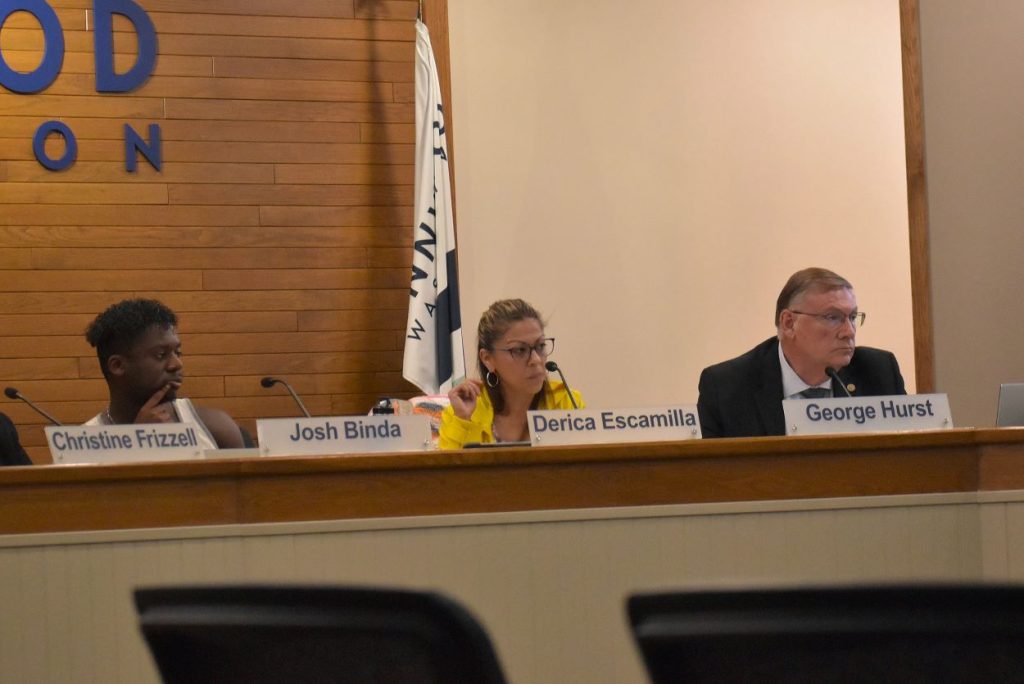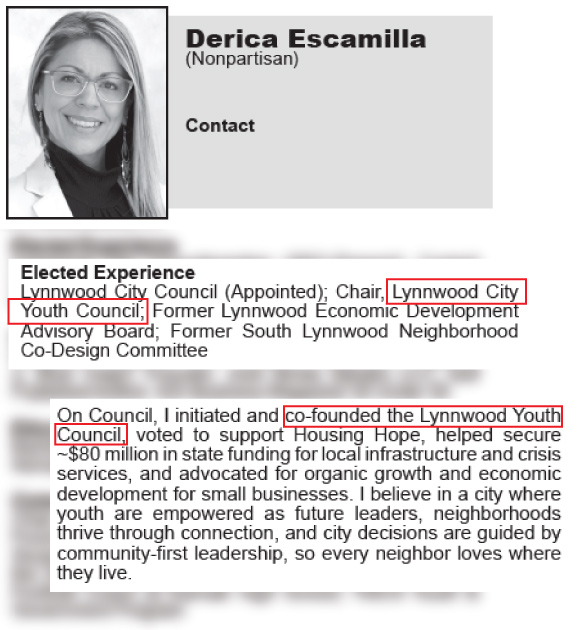LYNNWOOD—The Lynnwood City Council unanimously approved city staff to draft an ordinance which, if approved, would establish a Youth Commission with the purpose of giving youth a voice in government, decision-making, developing skills through mentorship and service, building connections, and making an impact on their own future.

The motion to approve the ordinance was originally brought forward by Council member Joshua Binda, at council’s Business Meeting on July 14, and seconded by Councilwoman Derica Escamilla. The two have been working together on this project since August of 2024 and collectively drafted the ordinance Binda moved to approve.
“This is what the youth asked for and I’m hoping we can establish this as an official advisory body and move forward,” said Binda to his motion.
However, the ordinance, as presented in the council’s packet, had some language issues as brought up by City Attorney Lisa Marshall, causing the adoption vote to be delayed until after staff could draft an ordinance which addressed these issues.
For one, the ordinance’s citing of the Lynnwood Municipal Code is not enforceable, Marshall pointed out in an email exchange to Councilwoman Escamilla leading up to the vote, the funding section is inconsistent with the contents of the enabling ordinances for other boards and commissions, the member qualifications are “confusing and lack specificity”, and certain issues (including meeting length) should be more appropriately included in its bylaws.
Despite City Attorney Marshall reviewing the ordinance (by way of city staff) and suggesting several changes, these changes were not present in the language that Binda originally moved to approve, nor were they reflected in the agenda packet. Both Councilman Patrick Decker and City Attorney Lisa Marshall pointed this out.
Councilwoman Escamilla replied to Decker that the commission had always needed to operate differently, from other boards and commissions, because it deals with youth. She noted that City Attorney Marshall’s recommendations were simply that – recommendations — and that the ordinance did not require a complete rewrite. Marshall disagreed stating the ordinance, as written, would not “withstand a vagueness and ambiguity challenge under the constitution.”
“There does need to be some cleanup done before the ordinance is ready for prime time,” said Marshall.

But when City Attorney Marshall began to explain that many of the changes were necessary, and that when an ordinance is entered into an agenda packet it’s ready for adoption, as worded, Escamilla constantly interrupted and talked over her.
“Is it not your job to then give us language that would make it legally clear,” asked Councilwoman Escamilla.
When Marshall said that it is not her job to rewrite Escamilla’s ordinance, Escamilla then asked if there is “another lawyer” she can go to. Mayor Christine Frizzell called for a five-minute “cooling off” recess to break the tension.
Both Escamilla and Binda, the stewards of this program and authors of the ordinance, included that they founded a Lynnwood Youth Council in their 2025 Primary Elections Voter’s Pamphlet under their elected and professional experience bios. Statements in the Voter’s Pamphlet were submitted by candidates no later than the end of May 2025, almost two months before Monday’s business meeting proposed vote.

However, according to Lynnwood City Administrator Julie Moore, such a Youth Council does not, and has not, existed.
“The City does not currently have a Youth Council/Board/Commission/Advisory group. We have had the Lynnwood Teen Advisory Group (LTAG) in the past, which was a program out of the Parks & Rec department, but that program went away around the Great Recession,” Moore told the Lynnwood Times. “Council will need to formally adopt an ordinance to enact and create a Youth Council as an Advisory Body. Staff will be working on edits to the draft ordinance to bring back for Council’s consideration soon.”

Binda has embellished his bios in the past, claiming he was a University of Washington student (confirmed by the UW to be false), and exaggerating his volunteerism, for example.
Prior to Binda’s motion, Council member Decker moved that the council approve staff to establish a Lynnwood Youth Council as a Youth Engagement program operated through the Parks and Recreation Department as a program – not a commission. This was one of two options in the council’s agenda packet but both Escamilla and Binda were staunchly opposed to having the Youth Council be a program under the Parks Department, in favor of it being a full-fledged commission.
Decker’s motion was seconded by council member Robert Leutwyler.
“I think the most expeditious way of getting youths involved in the city is through the Parks and Rec Department, which has controls in place to ensure that these minors are shielded from some of the less savory aspects of public service,” said Decker. “They have controls around access to the programs they have in the city to not allow random strangers from showing up and potentially harassing our youth, they also have proper safeguards related to background and checks for individuals who are interacting with these youths.”

Council Vice President Binda attempted to amend Decker’s motion to, instead of operating under the Parks Department, make the Youth Advisory Council a commission but Decker called this amendment a “material change,” to what was on the table.
Binda disagreed with Decker. Despite Mayor Frizzell siding with Binda she was interrupted by Councilwoman Derica Escamilla who called a “point of order,” talking over her to say that Binda was allowed to amend Decker’s motion. Mayor Frizzell deferred to the City Attorney who agreed with Decker that an amendment can be made on an existing motion, but not if the amendment ultimately changes the nature of the motion.
“Strictly speaking the amendment would need to pertain to the original motion so changing some element of the motion would be inappropriate,” said City Attorney Lisa Marshall who, when challenged by Binda, deferred to the chair for her decision.
When Mayor Frizzell asked Council member David Parshall what Robert’s Rules say about the matter, she was again interrupted by Councilwoman Escamilla.
“If we’re operating under strict Robert’s rules the amendment is inappropriate, which state that you cannot use an amendment to change the fundamental nature of the original motion, and this original motion is to establish a program in its original intent,” said Parshall. “This is an A or B choice I don’t think it’s an appropriate amendment.”
Councilwoman Escamilla dismissed Robert’s Rules as a “power play.”
City Attorney Marshall also chimed in to state that the ordinance surrounding the Youth Council was written as an advisory body in the agenda and by “scratching that out” and adding “commission,” it would require drafting of a whole new ordinance and deliberation.
Parshall advised the mayor to rule Binda’s amendment “out of order,” and continue voting on Decker’s original motion but Mayor Frizzell said Binda’s motion needed to be voted on. Binda then tried to change the language of his amendment before withdrawing it altogether when told he could not.
Parks Director Joel Faber, who has been a member of the Youth Council steering committee since the beginning, noted that programs do not operate under the same Open Public Meetings Act (OPMA) rules as a commission.
“We would still want to do the same work, it’s just a matter of how formal – whether the agendas are posted and whether they’re recorded – that’s what would change,” said Faber. “If this is intended to be, and wants to be, a steppingstone for teens to be mentored into how to move forward with council that’s a program we can run, whether we do it more formal or not formal.”
Council member Decker also pointed out that a commission would have to operate under the current Lynnwood Municipal Code and would not have flexibility to grow and have a larger footprint. A commission, having to adhere to OPMA rules, Decker continued, would also restrict members from talking amongst themselves outside of public view.

“It’s a hell no for me,” said Binda regarding Decker’s motion before shaming Joel Faber for his comments. “This is not what the youth asked for. I don’t know what politicking is going on but this is just weird at this point.”
Faber clarified that he was not speaking for, or against, the Youth Council being a commission or program only that he wants to see it happen, and be successful, rather than not happen at all.
Councilwoman Escamilla said that fearing OPMA requirements are “adult fears,” and the decision was ultimately made by the children who were consulted.
“I’m really disappointed and embarrassed,” said Councilwoman Escamilla. “I am tired of certain people on this council asking for clarity and communication, and time, and perspective when we clearly sat there and asked for Hispanic representation while I’m sitting at the table. This is the games that we’re playing here…quit gaslighting and delaying.”
Councilman Decker pointed out that since the steering committee began back in February, each meeting involved 10 adults and seven youths but only two of the youths were Lynnwood residents. His motion ultimately did not pass 3-4.
After some back-and-forth between council, Mayor, and city staff, council ultimately decided to approve a new motion (moved by Binda) that would allow City Staff to draft an ordinance addressing the various flaws in Binda and Escamilla’s original ordinance.
Decker made a simple amendment to Binda’s motion, rewriting some of the language for clarity and consistency, which Binda agreed to and seconded. Binda’s motion, as amended by Decker, was passed unanimously.
Staff will now draft a new motion with clearer language and present it to council on August 4 for a discussion during its Work Session.

Author: Kienan Briscoe













One Response
Binda in a tank top at a council meeting is hilarious 😆